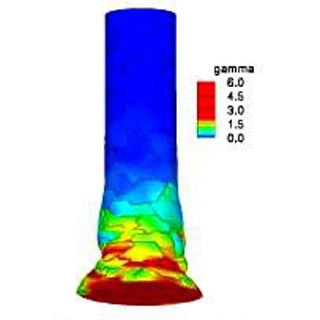Home » Course Layouts » Free Course Layout Udemy
16.225 is a graduate level course on Computational Mechanics of Materials.
0
1
English
English [CC]
- Learn basic syntax that can apply to any language.
- Learn what is a programming language and the basic concepts for beginners.
- Understand what is Javascript in it's truest form.
- Know the basic syntax of Javascript.
- Know some hidden quirks in Javascript.
Description
The primary focus of this course is on the teaching of state-of-the-art numerical methods for the analysis of the nonlinear continuum response of materials. The range of material behavior considered in this course includes: linear and finite deformation elasticity, inelasticity and dynamics. Numerical formulation and algorithms include: variational formulation and variational constitutive updates, finite element discretization, error estimation, constrained problems, time integration algorithms and convergence analysis. There is a strong emphasis on the (parallel) computer implementation of algorithms in programming assignments. The application to real engineering applications and problems in engineering science is stressed throughout the course.
Course content
- Elastic Solids Unlimited
- Vainberg Theorem Unlimited
- Specialized (Simplified) Variational Principles Unlimited
- Weighted – Residuals / Galerkin; Principle of Virtual Work Unlimited
- Sobolev Norms; Global Shape Function; Computation of K and fext; Isoparametric Elements Unlimited
- Higher Order Interpolation; Isoparametric Triangular Elements; Numerical Integration; Gauss Quadrature Unlimited
- Error Estimation, Convergence of Finite Element Approximations Unlimited
- Linear Elasticity; Numerical Integration Errors Unlimited
- Incompressible Elasticity; Hooke’s Law; Governing Equations Unlimited
- Constraints Ratio; Variational Principle of Incompressible Elasticity Unlimited
- Assumed Strain Methods Unlimited
- Finite Elasticity Unlimited
- Newton-Raphson Solution Procedure Unlimited
- Isoparametric Elements Unlimited
- Material Formulation Unlimited
- Time Dependent Problems Unlimited
- Constitutive Relations Unlimited
- Trapezoidal Rule – Heat Conduction Unlimited
- Connection Between Newmark Algorithm and Multistep Methods Unlimited
- Energy Conservation / Dissipation; Abstract Algorithms Unlimited
- Examples: Trapezoidal Rule; Newmark’s Algorithm; Stability Unlimited
- Multidimensional Case Unlimited
- Stability Properties of Trapezoidal Rule; Eigenprojections Unlimited
- Nonlinear Algorithms Unlimited
- Time-stepping Algorithms for Constitutive Relations Unlimited
N.A
- 5 stars0
- 4 stars0
- 3 stars0
- 2 stars0
- 1 stars0
No Reviews found for this course.










